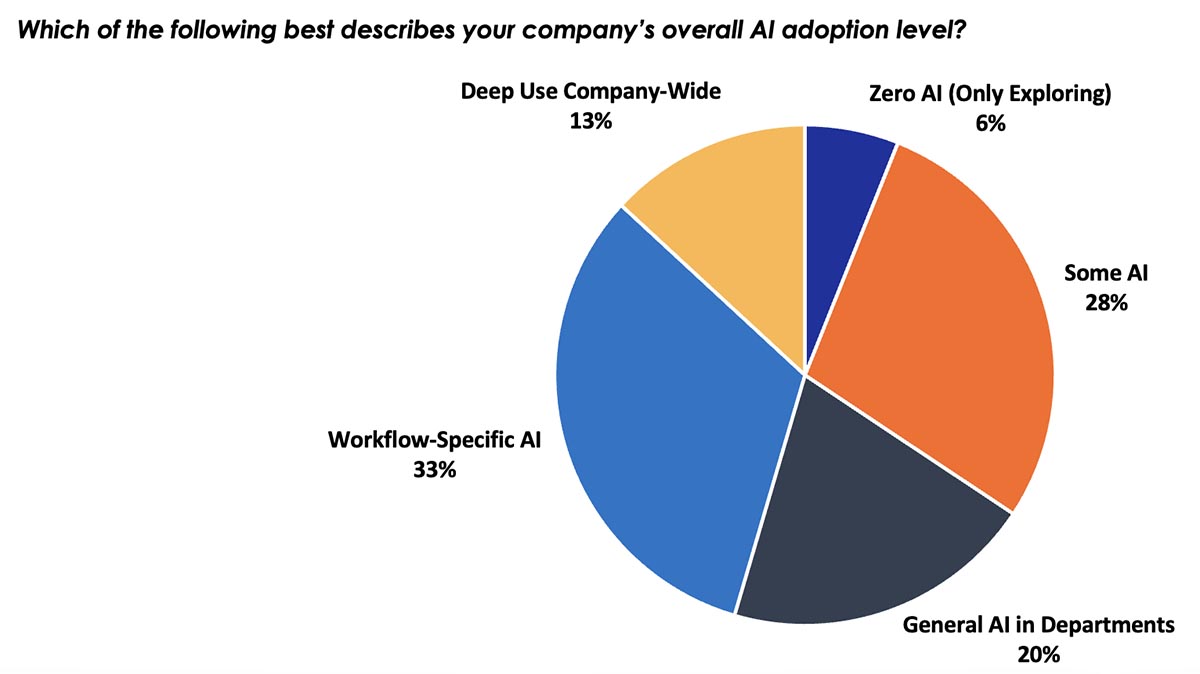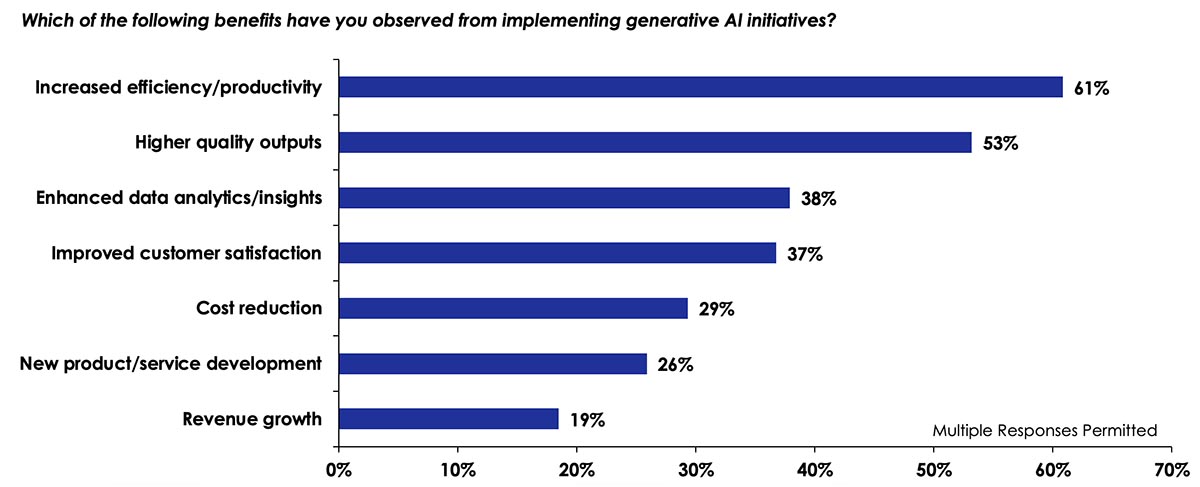What’s really happening in enterprise AI adoption? Keypoint Intelligence recently released a readiness survey of over 450 business leaders across a variety of industries. This article provides some key insights from our survey data and helps paint a picture of AI’s current impact and future potential.
- While AI adoption is certainly widespread, the degree of integration varies widely.
- AI technology has the potential to improve the quality of human work, not simply replace it.
- As AI becomes increasingly integrated into core business processes, fairness, transparency and accountability will become crucial.
By Anne Valaitis
Introduction
For years, we’ve been told that the artificial intelligence (AI) revolution is underway. However, the dust is settling after an initial wave of enthusiasm. So what’s really happening in the trenches of enterprise AI adoption? Keypoint Intelligence recently released an AI Readiness Survey of over 450 business leaders across a variety of industries to answer this question and more. This article shares some key insights from our survey data and paints a clearer picture of AI’s current impact and future potential.
AI is here to stay, but integration varies
There’s no doubt that the AI phenomenon is happening. According to our survey data, 94% of companies surveyed are using AI in some way. Additionally, 13% of them reported using AI extensively across the company.
Figure 1: Level of AI adoption

N = 454 total business respondents
Source: AI Readiness: A Comprehensive Benchmarking: Keypoint Intelligence 2024
At first glance, the chart above seems to validate the narrative of a burgeoning AI revolution. But dig a little deeper and a more complex story emerges. While adoption is certainly widespread, the degree of integration varies considerably. Many companies are still in the early stages, with more than a quarter of respondents (28%) using only some AI capabilities in existing tools (e.g., Salesforce). This suggests that while AI has clearly taken hold in the business world, we are far from the science fiction vision of AI-driven enterprises that some vendors would have us believe.
The reality is that most companies still don’t know how to meaningfully integrate AI into their operations. They’re exploring, experimenting, and gradually expanding their use cases, but most aren’t yet using AI in any depth. This measured approach is actually a positive sign: it indicates that companies are thinking about AI adoption rather than rushing into potentially risky or potentially ineffective implementations.
The impact of AI may be different than expected
Keypoint Intelligence’s AI Readiness Survey reveals that AI is having a significant impact, but that impact isn’t always happening in the ways or places you might expect. When asked about the benefits of AI initiatives, 61% of respondents cite increased efficiency and productivity, which is not surprising. Even more interesting, more than half of respondents said they’ve achieved higher quality results. This is a benefit that is often overshadowed by discussions of cost reduction and automation.
Figure 2: Key benefits of generative AI initiatives

N = 454 total business respondents
Source: AI Readiness: A Comprehensive Benchmarking: Keypoint Intelligence 2024
This focus on improving quality suggests that AI’s impact goes beyond simply speeding up or reducing the cost of processes. It improves the work that gets done, leading to better products, services, and decision-making. This crucial point is often forgotten in the noise of AI hype: the technology has the potential to improve the quality of human work, not just replace it.
Another unexpected finding was the impact of AI on cross-departmental collaboration. More than three-quarters of respondents (78%) to the same survey said AI technologies had significantly or moderately improved knowledge sharing and cross-departmental collaboration. This suggests AI’s potential as a unifying force within organizations, breaking down silos and fostering a more integrated approach to business challenges.
Future obstacles
As companies move beyond early experiments with AI, new challenges emerge. These include ethical considerations and data quality issues. Our survey found that 53% of companies are currently developing policies to address ethical considerations and biases related to AI, while 44% already have comprehensive policies in place.
The focus on ethics isn’t just about avoiding bad reviews or regulatory issues: it’s fundamental to creating AI systems that are trustworthy and can be relied upon to make critical business decisions. As AI becomes increasingly integrated into core business processes, fairness, transparency, and accountability will become crucial.
The quality of the data used to train AI models is equally important. When asked if they were confident in providing high-quality, relevant, and unbiased training data, 81% of our survey respondents expressed a high degree of confidence (rating it 4 or 5 on a 5-point scale). However, this high level of confidence may be misplaced given the well-documented challenges of sourcing and preparing AI-ready data.
The gap between data perception and reality could be the next major obstacle to AI adoption. As companies move toward more advanced AI applications, they may discover that their data isn’t as clean, complete, or unbiased as they thought. Addressing these data quality issues will likely be a major focus of AI initiatives in the years to come.
The essentials
Our survey paints a less flashy picture of AI adoption than recent headlines suggest, but one that is potentially more transformative in the long run. We are in the midst of a quiet revolution, with AI gradually becoming part of the very fabric of business operations. The challenge now is to move beyond hype and focus on the practical, ethical, and data-driven foundations that will enable AI to truly transform businesses. It’s not about adopting AI for its own sake, but about thoughtfully integrating it in ways that empower human capabilities, improve quality, and drive meaningful business outcomes.
In this new landscape, the true AI revolution won’t be driven by eye-catching headlines or miraculous overnight transformations. Instead, it will be driven by careful implementation, ethical thinking, and high-quality data…one business process at a time.
For more information on Keypoint Intelligence’s core research on the AI revolution, Click here.
As a principal analyst in Keypoint Intelligence’s AI practice, Anne Valaitis leverages her expertise in document management and artificial intelligence to help clients identify opportunities where AI can streamline operations, reduce costs, and shape new offerings that drive market demand and generate revenue. She has led numerous research projects that have influenced the document solutions landscape.


